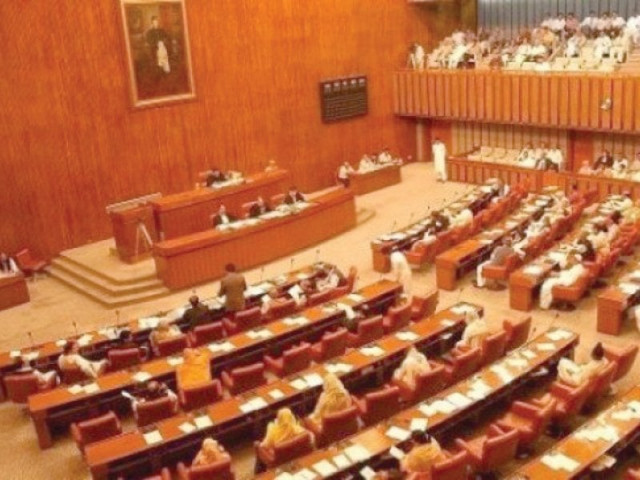Opposition: Senate panel tries to block power tariff hike
Also opposes increase in gas infrastructure development cess.

The Senate does not have the right to vote on the finance bill and its powers are restricted to giving recommendations to the NA. PHOTO: FILE
A Senate panel has recommended to the National Assembly to block the upcoming increase in prices of electricity and also opposed the government’s move to obtain the right to increase Gas Infrastructure Development Cess (GIDC) without notifying parliament.
The Senate Standing Committee on Finance and Revenue on Tuesday adopted two recommendations – bar the federal government from increasing electricity tariffs and revising upward the rates of GIDC from the next fiscal year 2014-15.
Headed by Senator Nasreen Jalil, the committee also termed a 10% increase in salaries of government employees “meagre”, asking the federal authorities to reconsider the decision.

It suggested that the government should not lower income tax rates for the affluent stock brokers and instead take money from these wealthy people and spend on education.
Electricity prices
The standing committee adopted a recommendation of the joint opposition in the Senate that suggested that electricity prices should not be increased. It pointed out that electricity tariffs had already been increased by 35% in the outgoing fiscal year, so the government should not further curtail power subsidies in the new budget.
As against Rs310 billion worth of power subsidies for the outgoing fiscal year, the government has allocated Rs185 billion for the new year, said Finance Secretary Waqar Masood.
He said the government would increase power tariffs but its percentage had not yet been decided. “Whatever the decision will be, prices for consumers using up to 300 units per month will not be increased,” remarked Masood.
The government has already assured the International Monetary Fund (IMF) that it will increase electricity tariffs. This will be in addition to the rise in electricity prices to be made to recover the circular debt from consumers through monthly bills.
GIDC
The standing committee also adopted a recommendation of Senator Ilyas Bilour that opposed the increase in GIDC through Finance Bill 2014, which is currently being debated in the National Assembly.
He argued that any change in GIDC should be introduced by amending the GIDC law that will also empower the Senate to cast its vote. The Senate does not have the right to vote on the finance bill and its powers are restricted to giving recommendations to the NA.
It is then up to the National Assembly whether it considers Senate recommendations appropriate or not.
The federal government is seeking the right to increase GIDC without notifying parliament or tabling a bill in parliament to revise the tax rates.
“Provided that the federal government may decide to levy any rate of cess on any category of gas consumers subject to the maximum rate provided in the Second Schedule,” reads the proposed finance bill.
Bilour said if the NA approved the government’s proposal, it would lead to increase in GIDC from Rs450 per million British thermal units (mmbtu) to Rs996 per mmbtu.
The federal government launched the move after the Supreme Court allowed provinces to have the first right on use of gas, which curtailed Punjab’s gas allocations, he added.
For the next fiscal year, the federal government has estimated receiving Rs145 billion by increasing GIDC against Rs88 billion collected during the outgoing fiscal year.
Senator Jalil said the move was unjustified and the issue would be taken up with Finance Minister Ishaq Dar.
CGT
Senator Osman Saifullah proposed that the government should not reduce capital gains tax on sale of shares from 17.5% to 12.5% from July. He said the state should charge CGT at 17.5% and allocate the collection on account of additional 5% for spending on education.
Planning Secretary Hasan Nawaz Tarar said despite devolution of the subject of education to provinces, the provision of basic education remained the responsibility of the Centre.
Published in The Express Tribune, June 11th, 2014.
Like Business on Facebook, follow @TribuneBiz on Twitter to stay informed and join in the conversation.


1733130350-0/Untitled-design-(76)1733130350-0-208x130.webp)
















COMMENTS
Comments are moderated and generally will be posted if they are on-topic and not abusive.
For more information, please see our Comments FAQ